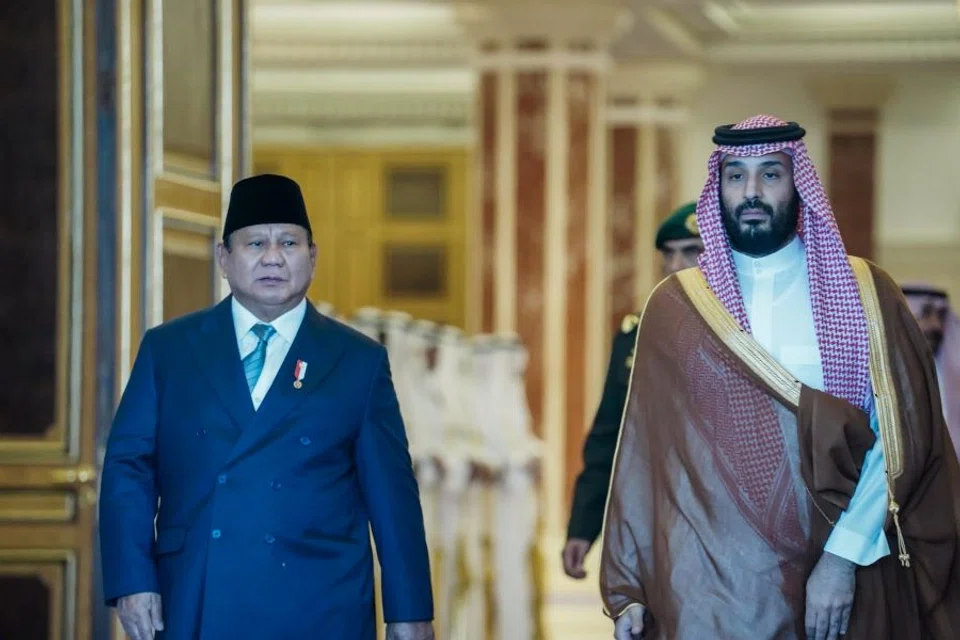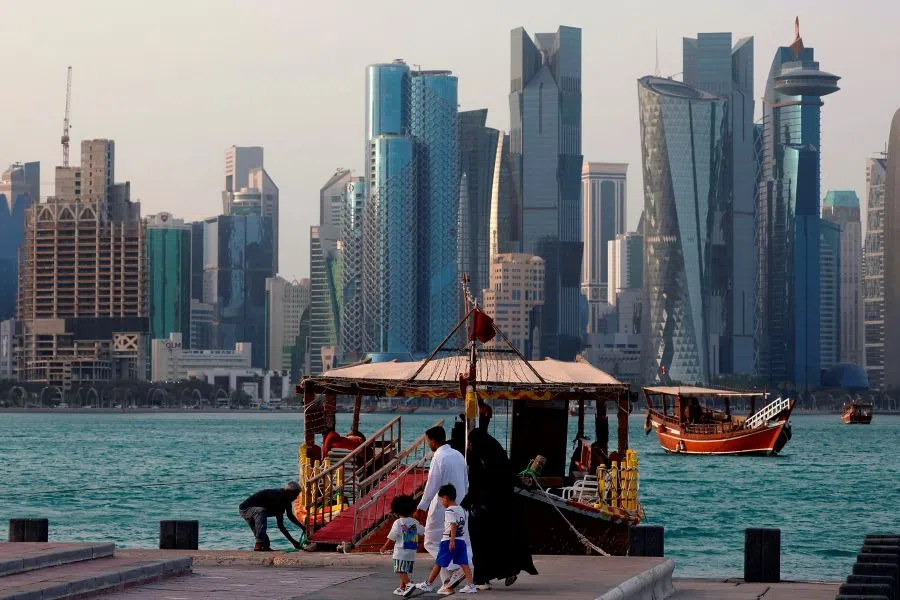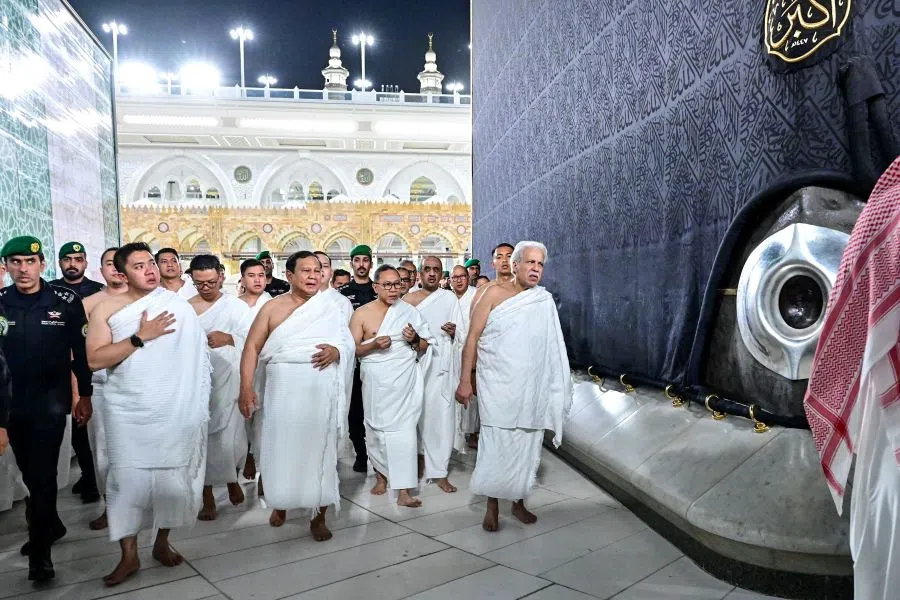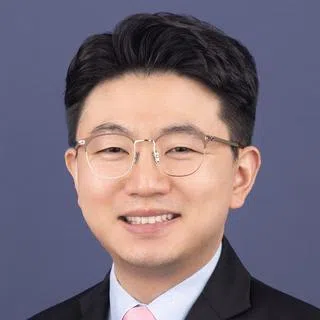Prabowo’s Gulf pivot: Indonesia’s strategic realignment in a fragmented world
Indonesia is making decided moves to centre the Gulf as a pillar of Indonesia’s economic strategy, regional diplomacy and geopolitical balancing, says academic Hao Nan.

President Prabowo Subianto’s state visit to Saudi Arabia from 1-3 July — his first as Indonesia’s head of state — culminated in US$27 billion worth of economic cooperation agreements and marked a clear signal that Jakarta is reimagining its global partnerships.
Scheduled just ahead of his participation in the BRICS summit in Brazil, this was more than just diplomatic choreography. It was a calculated move to centre the Gulf as a pillar of Indonesia’s economic strategy, regional diplomacy and geopolitical balancing. From Riyadh to Rio, Prabowo is drawing a new map for Indonesia in a multipolar world.
... the council institutionalises what is quickly becoming a long-term strategic partnership between two of the world’s most influential Muslim-majority nations.
Synergy between two major Muslim-majority nations
In Jeddah, Prabowo co-chaired the inaugural meeting of the Saudi-Indonesian Supreme Coordination Council with Crown Prince Mohammed bin Salman — a strategic forum modelled on Saudi Arabia’s dialogues with global powers such as China and the US.
Their session produced plans for deep cooperation across various sectors, including green hydrogen, water desalination, petrochemicals, pharmaceuticals, agriculture and minerals processing. The scale is historic, but the structure matters even more: the council institutionalises what is quickly becoming a long-term strategic partnership between two of the world’s most influential Muslim-majority nations.
At the economic core of the visit was the announcement of potential US$10 billion investments involving Saudi utility ACWA Power, Indonesia’s sovereign wealth fund Danantara, and national oil firm Pertamina. Projects include 500 megawatts of renewable energy, green hydrogen development and water desalination — all contributing to Indonesia’s national targets of 34% renewables by 2034 and 87% by 2060. These are not symbolic gestures — they’re structural pillars of Indonesia’s energy transition, powered by Gulf expertise and capital.

Qatar and the UAE part of the game
But this Gulf tilt is not limited to Saudi Arabia. In April, Indonesia launched a US$4 billion joint fund with Qatar focused on energy, digital economy and high-tech industries. Meanwhile, Prabowo’s visit to the United Arab Emirates (UAE) earlier in the same tour laid the groundwork for broader economic and defence cooperation. During high-level talks in Abu Dhabi, Indonesia and the UAE signed eight memoranda of understanding spanning infrastructure, digital transformation, and even joint humanitarian operations in Gaza.
This tripartite Gulf engagement — Saudi Arabia, Qatar, and the UAE — forms the economic spine of Prabowo’s new south-south diplomacy. It reflects a recognition that traditional Western markets are growing less reliable.
Indonesia’s new south-south diplomacy
This tripartite Gulf engagement — Saudi Arabia, Qatar, and the UAE — forms the economic spine of Prabowo’s new south-south diplomacy. It reflects a recognition that traditional Western markets are growing less reliable.
Europe’s Carbon Border Adjustment Mechanism (CBAM) and President Trump’s “America First” economic and foreign policy agenda penalise Gulf exporters and erode global competitiveness. Geopolitical instability in the Red Sea and Suez Canal, particularly the Israel-Iran 12-day war, along with Iran’s threats to block the Strait of Hormuz, only underscores the urgency of securing more stable routes, assets and partners — Indonesia, with its strategic position across the Malacca and Sunda Straits, is exactly that.

The Gulf, for its part, is not merely shopping for growth. It is pursuing a long-term diversification strategy. Saudi Arabia’s Vision 2030 aims to globalise its green energy leadership. Qatar seeks to safeguard LNG export relevance in Asia. The UAE, meanwhile, is positioning itself as a high-tech investment hub and global logistics node. All three find in Indonesia an ideal counterpart: the world’s fourth most populous nation, blessed with mineral wealth, growing energy demand, a youthful population, and increasingly coherent industrial policies.
Courting capital for for integrated, industrial upgrading
Indonesia has become especially attractive due to its clear stance on resource sovereignty. Its ban on raw nickel exports and focus on domestic smelting has transformed it into the world’s largest stainless steel exporter and a fast-rising player in the global EV battery supply chain.
Gulf investors are not just being offered raw materials — they are being invited to co-create industrial ecosystems. From nickel processing and cathode materials to battery plants and downstream hydrogen value chains, the vision is one of shared transformation.
Prabowo has signalled that he will maintain the policy continuity of his predecessor, Joko Widodo, and his ambitious Golden Indonesia 2045 Vision — particularly in downstreaming, infrastructure and regulatory reform. The Omnibus Law streamlines investment processes, even as environmental and labour safeguards remain debated. Still, the direction is clear: Indonesia is courting capital not only for extractive industries but for integrated, industrial upgrading. And Gulf investors, with their appetite for long-horizon strategic partnerships, are answering that call.
The UAE, Qatar and Saudi Arabia — each navigating their own complex ties to the West — view Indonesia’s principled neutrality and growing influence as valuable diplomatic capital...

Cultural affinity strengthens this momentum. In Saudi Arabia, Prabowo was granted the rare privilege of praying inside the Kaaba during his Umrah — a sign of deepening trust and shared religious identity. In the UAE, his humanitarian focus resonated with leaders who share an interest in expanding soft-power footprints through aid and regional diplomacy. In both Riyadh and Abu Dhabi, Prabowo positioned Indonesia as a voice of moderation, capable of bridging divides in the Islamic world and beyond.
Indonesia’s principled neutrality and growing influence valued
Nowhere is this clearer than in Prabowo’s active stance on the Israel-Palestine conflict. In June, he and Malaysian Prime Minister Anwar Ibrahim jointly affirmed the need for a two-state solution and immediate ceasefires, condemning Israeli actions and supporting humanitarian aid to Gaza. The UAE, Qatar and Saudi Arabia — each navigating their own complex ties to the West — view Indonesia’s principled neutrality and growing influence as valuable diplomatic capital in a region hungry for stable interlocutors.
Indonesia’s recent entry into the BRICS bloc adds yet another layer. All three Gulf regional powers — UAE, Saudi Arabia, and Iran — have joined BRICS, giving rise to an emerging financial and trade platform that could prepare alternatives to the dollar’s dominance and create more space for south-south alignment. Prabowo’s debut appearance at the Rio de Janeiro BRICS summit signals that Jakarta is no longer content with passive multilateralism — it seeks to shape the agenda.
... Indonesia’s leadership within ASEAN positions it as a central node linking Gulf energy and capital with East Asian demand.

Furthermore, the recently concluded second GCC-ASEAN Summit and the inaugural GCC-ASEAN-China Summit further underscore the accelerating institutional convergence between Southeast Asia and the Gulf. For Indonesia, these platforms provide multilateral scaffolding to elevate what were once bilateral ties into broader strategic alignments.
The GCC-ASEAN framework offers opportunities for harmonising trade rules, investment standards, and infrastructure development strategies — paving the way for Indonesian-Gulf joint ventures to expand across the region. Simultaneously, the trilateral dynamic involving China adds depth to shared initiatives in logistics, energy corridors, and digital infrastructure, where Indonesia’s leadership within ASEAN positions it as a central node linking Gulf energy and capital with East Asian demand.
Potential pitfalls
Still, there are pitfalls. Indonesia must move swiftly to convert memoranda into operational projects. Delays in past Gulf investments have undermined credibility. Environmental, social and governance (ESG) risks, especially in nickel mining regions, could pose reputational threats to Gulf partners increasingly sensitive to environmental standards. And competition is intensifying — from China’s nickel processing empire to Japan and Korea’s infrastructure footholds. Indonesia must prove that it offers not only access but execution.
Prabowo’s Gulf diplomacy shows Indonesia’s ambition to lead — not just regionally, but as a voice of the global south. By balancing energy security, religious diplomacy, and geopolitical non-alignment, he is constructing a foreign policy doctrine rooted in resilience and relevance. The Gulf is no longer just a fuel source — it is Indonesia’s gateway to a multipolar future.



![[Video] George Yeo: America’s deep pain — and why China won’t colonise](https://cassette.sphdigital.com.sg/image/thinkchina/15083e45d96c12390bdea6af2daf19fd9fcd875aa44a0f92796f34e3dad561cc)
![[Big read] When the Arctic opens, what happens to Singapore?](https://cassette.sphdigital.com.sg/image/thinkchina/da65edebca34645c711c55e83e9877109b3c53847ebb1305573974651df1d13a)
